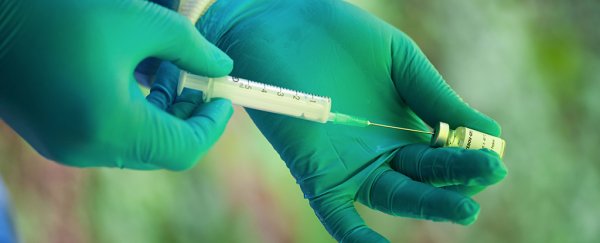Researchers have developed an Ebola vaccine which provides 100 percent protection against one particularly dangerous strain of the disease, based on final field tests on thousands of people in West Africa.
While the vaccine didn't arrive in time to stop the 2014 outbreak that began in Guinea, it could be vital in preventing further epidemics – and public health experts have already stockpiled 300,000 doses of the drug for the next emergency.
Known as rVSV-EBOV, the vaccine prevented the development of Ebola in everyone it was given to during its field test, and its makers are now seeking regulatory approval for the drug so it can be more widely used.
"When the next outbreak hits, we will not be defenceless," lead researcher Marie-Paule Kieny, from the World Health Organisation, told Donald McNeil Jr. at the New York Times.
"The world can't afford the confusion and human disaster that came with the last epidemic."
Occasional new cases of Ebola are still being reported in Guinea, where researchers trialled a technique called "ring vaccination". That means as soon as someone contracts the disease, the vaccine is given to those they've come into close contact with.
None of the 5,837 people who were given the vaccine had developed Ebola after 10 days, the study found. In contrast there were 23 new Ebola cases among the several thousands of people who didn't get vaccinated.
That's a hugely promising result, but we're not completely rid of Ebola just yet: although rVSV-EBOV works against Zaire ebolavirus, the subtype of Ebola responsible for most human infections, it doesn't work against the other four subtypes.
The drug also leads to some unwelcome side effects, researchers reported, including joint pain and headaches. While that might be okay in the midst of an outbreak, it's going to put off the general population from getting vaccinated in healthier times.
The vaccine is made up of the vesicular stomatitis virus (which harms cattle but doesn't make humans sick) and an Ebola virus surface protein that prompts the human body to produce antibodies.
Now further studies are underway to investigate the vaccine's effects on children and vulnerable subjects (such as those with HIV). The vaccine's backers are hoping to have it submitted for a licence by the end of 2017.
Let's hope this vaccine and others like it are ready in time for the next outbreak.
"Ebola left a devastating legacy in our country," says Director of the National Agency for Health Security in Guinea, KeÏta Sakoba. "We are proud that we have been able to contribute to developing a vaccine that will prevent other nations from enduring what we endured."
The findings of the study have been published in The Lancet.
